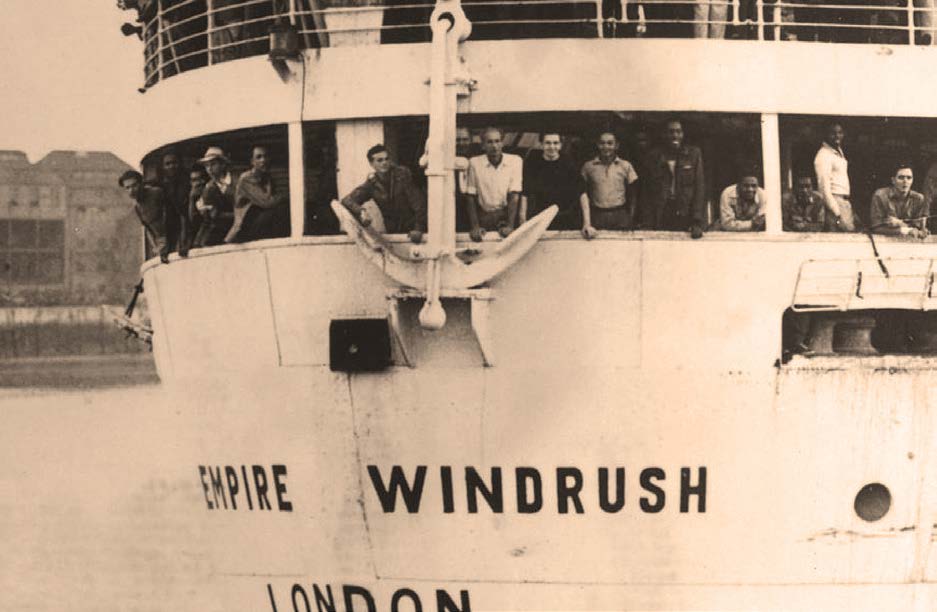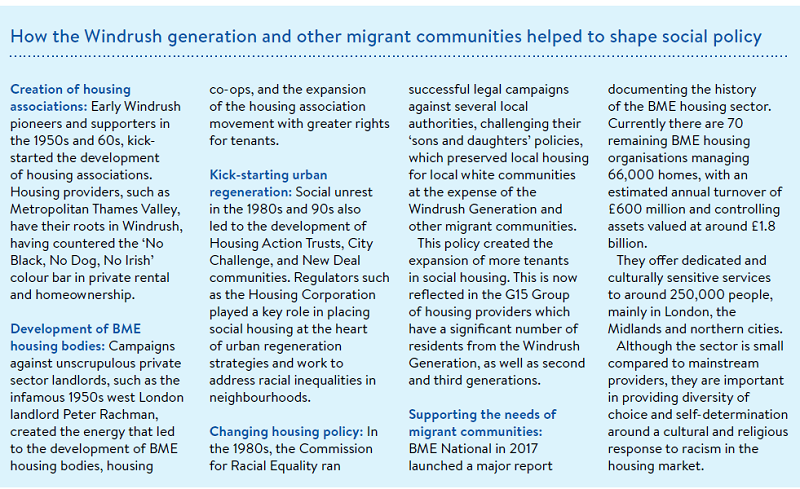Patrick Vernon OBE and Senior associate, OLMEC, and Windrush campaigner writes about the importance of recognising the positive impact of the Windrush generation and outlines a call to action for housing providers.
 The 22 June 2018 marked the 70th anniversary of HMT Empire Windrush’s arrival in England at Tilbury Docks in 1948 from Kingston, Jamaica. With the introduction of the 1948 British Nationality Act and the creation of the NHS, it is no coincidence that migration markedly increased from the former British Empire. Subjects heard the call from ‘The Mother Country’ to help rebuild Britain in the aftermath of World War II and tackle its chronic labour and skills shortages.
The 22 June 2018 marked the 70th anniversary of HMT Empire Windrush’s arrival in England at Tilbury Docks in 1948 from Kingston, Jamaica. With the introduction of the 1948 British Nationality Act and the creation of the NHS, it is no coincidence that migration markedly increased from the former British Empire. Subjects heard the call from ‘The Mother Country’ to help rebuild Britain in the aftermath of World War II and tackle its chronic labour and skills shortages.
Until the recent Windrush Scandal, however, and in the ‘hostile environment’ to BME communities facilitated by the media and government, many people did not value the contribution immigration makes to British society. It has influenced everything from the NHS to the monarchy, our language, literature, enterprise, public life, fashion, music, politics, science, culture, food and even humour.
Recognition
That is why, after a 10-year campaign, from 22 June 2019, there will be a national Windrush Day with annual funding from the Ministry of Housing, Communities & Local Government for local government and community organisations to stage commemorative events. Even Theresa May, at the height of the Windrush Scandal, conceded that the Windrush Generation is part of British history and the narrative of a multicultural society, which is important to recognise as we move into post-Brexit Britain.
This should be an important date in the housing sector’s annual calendar. The Windrush Generation, and migration in general since WWII, has made a major contribution in shaping social policy through the development of social housing and homelessness policy and services (see box below).

Return to social roots
With the introduction of the hostile environment policy in 2014 and the subsequent Windrush Scandal in 2018, social landlords – in common with the NHS and local government – have effectively become part of UK border control in discriminating against the Windrush Generation and other Commonwealth nationals. Many people are now vulnerable
and victims of institutionalised racism and a back-door reparation policy by the government. It feels like we are moving back in time to the 1960s. As such, it is important the housing movement returns to its roots around social justice and
supporting people.
A successful recent legal case, brought by the Joint Council for the Welfare of Immigrants (JCWI), found the government guilty of implementing a policy that discriminated against people from BME backgrounds in the private rental market as a result of their immigration status. This reminds us that race disparity is still a major issue today in the UK.
Call to action
I thus urge housing providers and others who have influence in the housing sector to respond to the following call to action:
- Follow the steps of 13 local authorities (Birmingham, Hackney, Brent, Southwark, Lambeth, Barking and Dagenham, Croydon, Liverpool, Cardiff, Luton, Newham, Lewisham and Trafford) which have now passed full council Windrush motions. These commit them to review the impact of their policies and services on the Windrush Generation and other migrant communities, in the context of the hostile environment policy.
- Review financial inclusion policies to support residents who have lost state pensions, disability and universal credit as a result of the hostile environment policy.
- Suspend all action for eviction where residents are seeking to determine their status under the Windrush Scheme for citizenship.
- Commission and/or develop services with organisations like JCWI and Praxis to provide legal advice on immigration and nationality status.
- Support the Windrush Justice Fund, which gives small grants to grassroots and community-based organisations that support victims of the Windrush Scandal. More than £40,000 has been raised (including a £20,000 donation from London mayor Sadiq Khan).
- Use social investment funds to support residents to access training and emotional support.
- Review board and senior management roles to ensure BME staff are reflected at all levels in your organisation. Work with OLMEC, which has developed the successful Black on Board Programme, to address the gap regarding the under-representation of BME staff in the housing sector.
- Promote and celebrate the history of the Windrush Generation and migration communities by getting involved with national Windrush Day on the 22 June 2019.
For the past 70 years, without the contribution of the Windrush Generation and migrant communities, the social housing movement would not have had the same impact and reach in Britain. As a result, housing sector leaders should do more as we approach the first national Windrush Day in June. They should reflect the contribution of migrants at major conferences, award ceremonies and events in acknowledging the pioneers and current achievers from the sector and other fields.
This article first appeared in CT Brief – Issue 42
For more information, please contact: zina@campbelltickell.com



